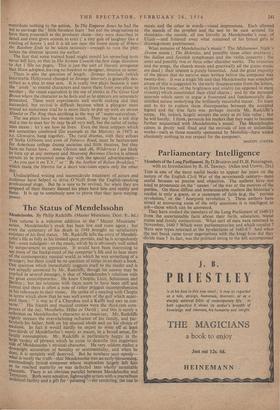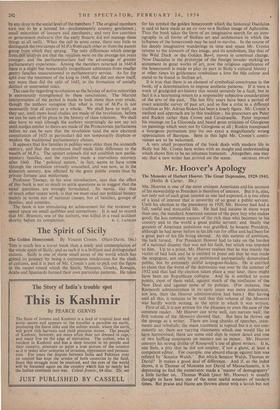Parliamentary Intelligence
Members of the Long Parliament. By D.Brunton and D. H. Pennington, with an Introduction by R. H. Tawney. (Allen and Unwin. 21s.)
Tins is one of the most useful books to appear for years on the nature of the English Civil War of the seventeenth century—most useful because so precise and objective. The authors have not tried to pronounce on the causes ' of the war or the motives of the parties. On those diffuse and immensurable matters the historian's verdict is only a guess, or a statement of faith (e.g. the puritan revolution,' or the bourgeois revolution '). These authors have aimed at answering some of the only questions it is intelligent to ask—those which can be answered.
They have studied the members of the Long Parliament of 1640-53 from the ascertainable facts about their birth, education, social status and family connections. What sort of men were returned in November, 1640 ? Which went parliamentarian and which royalist ? Were new types returned at the by-elections of 1645-8 ? And when the last break came (over negotiations with the king) how did they divide then ? In fact, was the political swing to the left accompanied by any drop in the social level of the members ? The original members turn out to be a normal lot—predominantly country gentlemen ; small minorities of lawyers and merchants ; and very few courtiers or government stalwarts (for the early Stuarts did not manage these things at all well). When the call to arms came, there was little to distinguish the two camps of M.P.s from each other or from the parent group from which they sprang. The only differences which emerge from this analysis are that the royalists were on the average ten years younger, and the parliamentarians had the advantage of greater parliamentary experience. Among the members returned in 1645-8 there is a slight but numerically insignificant admixture from smaller gentry families unaccustomed to parliamentary service. As for the split over the treatment of the king in 1648, that did not show itself, any more than did the split of 1642, in the formation of socially distinct or contrasted sides.
The case for regarding revolutions as the heyday of active minorities is enormously strengthened by these conclusions. The Marxist interpretation of the period is made to look more than ever crude, though the authors recognise that what is true of M.P.s is not necessarily true of society as a whole. We shall have to wait, as they say, until more local studies are made of the revolution, before we can be sure of its place in the history of class relations. We shall also have to wait (though the authors surprisingly do not say so) until studies similar to theirs are made of the Protectorate parliaments before we can be sure that the revolution (and the new electoral constitution of 1653 in particular) did not temporarily displace or weaken the traditional parliamentary classes.
It appears that few families in politics were older than the sixteenth century, and that the revolution itself made little difference to the wealth of M.P.s. The upstart colonels did not establish new parlia- mentary families, and the royalists made a marvellous recovery after 1660. The political nation,' in fact, seems to have come through the revolution yirtually unscathed, and was now, as in the sixteenth century, less affected by the great public events than by private fortune and misfortune. Professor Tawney, in his wise introduction, says that the effect of this book is not so much to settle questions as to suggest that the usual questions are wrongly formulated. Its moral, like that of much other recent work, is that we must read our political history mainly in terms not of national classes, but of families, groups of families, and counties.
The book is too stimulating an achievement for the reviewer to spend space on small quibbles and corrections. It is sad to record that Mr. Brunton; one of the authors, was killed in a road accident shortly before its completion, R. C. LATHAM



































 Previous page
Previous page